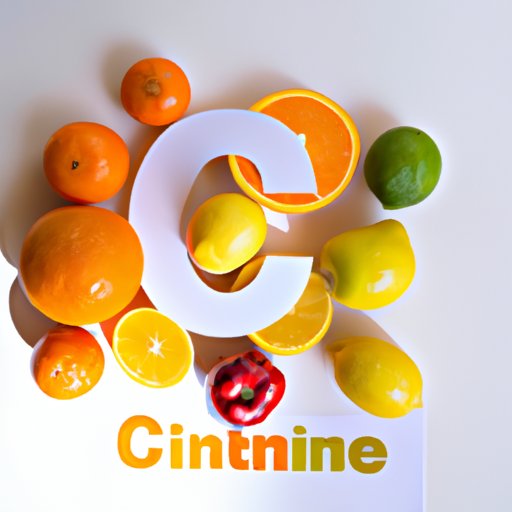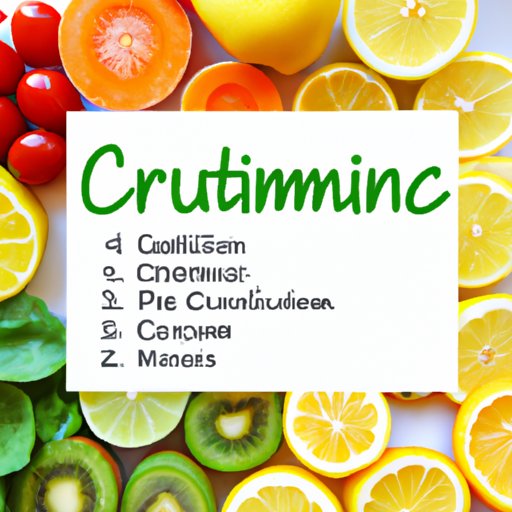
Introduction
When it comes to maintaining a healthy diet and supporting your immune system, getting enough vitamin C is essential. This powerful nutrient serves as an antioxidant, helping to combat inflammation and protect your cells from damage. In addition to its immune-boosting benefits, vitamin C can also help your body absorb iron, promote healthy skin, and improve cognitive function. With so many benefits, it’s no wonder that many people want to know which foods contain vitamin C and how they can incorporate more of it into their diets.
Top 10 Foods Rich in Vitamin C to Boost Your Immunity
If you’re looking to up your intake of vitamin C and boost your immune system, there are plenty of delicious options to choose from. Here are the top 10 foods that are especially high in vitamin C:
- Oranges
- Red bell peppers
- Strawberries
- Broccoli
- Kiwi
- Guava
- Grapefruit
- Brussels sprouts
- Tomatoes
- Papaya
These foods are not only delicious, but they are also versatile and can be easily incorporated into many different meals. For example, you could start your day with a refreshing citrus fruit salad or snack on sliced bell peppers with hummus. Add broccoli to a stir-fry or sauté Brussels sprouts as a side dish. There are endless possibilities for incorporating these vitamin C-rich foods into your diet.
Getting Your Daily Dose of Vitamin C: A Comprehensive Guide
So how much vitamin C do you actually need each day? According to the National Institutes of Health, adult men need about 90mg of vitamin C per day, while women need about 75mg. However, depending on factors such as age, pregnancy, and smoking status, your recommended daily intake may be higher.
In addition to the top 10 foods listed above, there are several other foods that contain vitamin C in smaller amounts. These include:
- Pineapple
- Mango
- Leafy greens such as kale, spinach, and collard greens
- Potatoes
- Cantaloupe
- Cauliflower
While it’s certainly possible to get enough vitamin C from your diet alone, some people may choose to take supplements to ensure they are getting enough of this crucial nutrient. However, it’s important to talk to your healthcare provider before starting any new supplement regimen, as high doses of vitamin C can cause side effects such as diarrhea and nausea.
The Power of Vitamin C: Why Your Diet Needs it and What to Eat
Vitamin C is an essential nutrient that plays a vital role in overall health and wellbeing. In addition to its antioxidant properties, vitamin C is also important for healing wounds, repairing tissues, and supporting healthy bones, teeth, and gums. This nutrient is also critical for maintaining healthy skin, which can help to reduce the signs of aging and protect against sun damage.
In addition to the top 10 foods listed above, there are several other foods that contain different forms of vitamin C. For example, camu camu berries and acerola cherries are both particularly high in vitamin C, but they are not as well-known as citrus fruits. Fermented foods such as sauerkraut and kimchi can also provide a source of vitamin C, as can some types of seafood such as oysters and mussels.

The Ultimate List of Fruits and Vegetables High in Vitamin C
When it comes to getting enough vitamin C, fruits and vegetables are some of the best sources available. Here is a comprehensive list of fruits and vegetables that are high in vitamin C:
- Oranges
- Grapefruit
- Lemon
- Limes
- Tangerines
- Kiwi
- Mango
- Papaya
- Pineapple
- Strawberries
- Guava
- Blackberries
- Blueberries
- Raspberries
- Cantaloupe
- Honeydew
- Watermelon
- Red bell pepper
- Green bell pepper
- Jalapeno pepper
- Broccoli
- Cauliflower
- Tomatoes
- Brussels sprouts
- Spinach
- Kale
- Cabbage
- Collard greens
- Sweet potato
- White potato
- Butternut squash
- Acorn squash
With so many options available, it’s easy to incorporate a variety of vitamin C-rich fruits and vegetables into your diet. Try creating a colorful salad with mixed greens, bell peppers, and citrus fruits, or blend up a tropical smoothie with mango, papaya, and pineapple. Roast some Brussels sprouts or cauliflower with a little olive oil and garlic, or add some sliced tomatoes to your sandwich or wrap.
Beyond Oranges: Surprising Sources of Vitamin C You Should Know About
While citrus fruits are perhaps the most well-known source of vitamin C, there are several other foods that contain this important nutrient as well. Here are some non-citrus fruits and vegetables that are high in vitamin C:
- Strawberries
- Kiwi
- Papaya
- Guava
- Blackcurrants
- Red and yellow bell peppers
- Broccoli
- Brussels sprouts
- Cauliflower
These options provide different flavors and textures than traditional citrus fruits, making it easy to add variety to your diet while still getting plenty of vitamin C. Try grilling some bell pepper slices or roasting some broccoli with a sprinkle of Parmesan cheese for a tasty and nutritious side dish.
Vitamin C for a Healthier You: Incorporating These Foods into Your Diet
If you’re looking for ways to incorporate more vitamin C-rich foods into your diet, there are plenty of simple and delicious options available. Try some of these tips:
- Create a colorful salad with mixed greens, bell peppers, tomatoes, and a squeeze of lemon or lime
- Make a fruit salad with a variety of vitamin C-rich fruits such as strawberries, mango, and pineapple
- Blend up a smoothie with spinach, strawberries, and kiwi
- Roast some Brussels sprouts or cauliflower with a sprinkle of turmeric or cumin for an added nutritional boost
- Add some sliced tomatoes or red bell pepper to your sandwich or wrap
By incorporating more vitamin C-rich foods into your diet, you can reap the many benefits of this essential nutrient while enjoying delicious and nutritious meals and snacks.
Maximizing the Benefits of Vitamin C: How to Ensure You’re Getting Enough
While getting enough vitamin C is important for maintaining overall health and wellbeing, it’s also important to make sure you’re not getting too much. High doses of vitamin C supplements can cause gastrointestinal issues such as diarrhea and nausea, and may also interfere with the absorption of certain medications.
To maximize the benefits of vitamin C while avoiding potential risks, it’s important to get your daily dose through whole foods whenever possible. In addition to the fruits and vegetables mentioned above, other good sources of vitamin C include fortified cereals, some types of meat and poultry, and certain types of seafood.
Lastly, if you’re concerned about your vitamin C intake or have questions about whether a supplement is right for you, it’s always a good idea to talk to your healthcare provider for advice.
Conclusion
Vitamin C is an important nutrient that can help to support many aspects of your health, from your immune system to your skin and beyond. By incorporating more vitamin C-rich foods into your diet, you can enjoy the many benefits of this powerful antioxidant while enjoying delicious and nutritious meals and snacks. Whether you stick to traditional citrus fruits or branch out to some of the lesser-known sources of vitamin C, there are plenty of tasty options to choose from.




